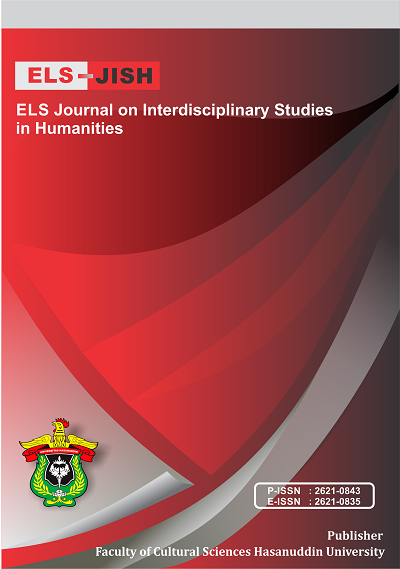Issues with the Speaking Section of the International English Language Testing System (IELTS): An Assessment Critique
DOI:
https://doi.org/10.34050/elsjish.v6i3.28355Keywords:
Assessment Critique, IELTS, Issues, SpeakingAbstract
The International English Language Testing System (IELTS) is one of the most widely used tests of English internationally. It is a testing system designed or owned by three partners: University of Cambridge ESOL Examination, British Council, and IDP Australia. This research is to critique the speaking section of the IELTS based on the experience of some test-takers involved as the subjects of this research. The method used was descriptive qualitative. Data collection techniques applied were content analysis, interview, and self -reflection. Two IELTS test-takers were interviewed to get their views on the three phases of the speaking section. The authors’ own experiences when taking the IELTS were also reported. It was found that there are issues with the speaking section of the IELTS. Those issues are its: fairness, authenticity, validity, and the appropriateness of interview as a sole tool to assess speaking ability. This paper also suggests a number of actions to be taken in order to make the speaking section fair, authentic, and valid. Additionally, other ways of assessing speaking ability are proposed. This paper then reveals what these issues mean to test-takers, examiners, and organizations running IELTS.
References
Anada, R. P., Arsyad, S., & Dharmayana, I. W. (2018). Argumentative Features of International English Language Testing System (IELTS) Essays: A Rhetorical Analysis on Successful Exam Essays. International Journal of Language Education, 2(1), 1-13.
Anderson. (1998). Fundamentals of educational research (2nd ed.). London & New York: Falmer.
Ashwin, P. (2015). Assessment: how does it make a contribution to learning. In Ashwin, Paul (Ed.) Reflective teaching in higher education (pp. 249-273). Bloomsbury, London.
Brown, H. D., & Abeywickrama, P. (2010). Language assessment: principles and classroom practices (2nd ed. ed.). White Plains, NY: White Plains, NY : Pearson Education.
Brown, Sally, Race, & Phil. (2012) Using effective assessment to promote learning. In Hunt, Lynne & Chalmers, Denise (Eds.), University teaching in focus: a learning-centred approach (pp. 74-91). Camberwell, Vic.: ACER Press.
Bruning, R. H. (2010). Cognitive psychology and instruction (5th ed. ed.). Boston: Boston : Pearson.
Cambridge University Press. (2006). Cambridge IELTS 5. Cambridge: Cambridge University Press.
Darr, C. (2005). A hitchhiker’s guide to validity. Journal issue, (2).
Franks, T. M. (2016). Purpose, practice, and (discovery) process: When self-reflection is the method. Qualitative Inquiry, 22(1), 47-50.
Hughes, A. (2003). Testing for language teachers. Cambridge: Cambridge University Press.
Issit, S. (2008). Improving scores on the IELTS Speaking Test. ELT Journal, 62, 131-138. http://dx.doi.org/10.1093/elt/ccl055
Karim, S., & Haq, N. (2014). An assessment of IELTS speaking test. International Journal of Evaluation and Research in Education (IJERE), 3(3), 152-157.
Miles M.B. & Huberman, A.M. (1994). Qualitative data analysis (2nd Ed.). California: SAGE Publications Inc.
Nunan, D. (1999). Second language teaching and learning. Boston, Mass.: Boston, Mass. : Heinle & Heinle.
Read, J. (2022). Test Review: The International English Language Testing System (IELTS). Language Testing, 39(4), 679-694.
Roshan, S. (2013). A critical review of the revised IELTS speaking test. International Journal of English Language Education, 2(1), 120-127.
Saldana, J. (2011). Fundamentals of qualitative research. New York: Oxford University Press.
School of Humanities and Creative Arts, Flinders University. (2017). ESOL methodology study guide, Semester 2. [ESOL8004]. School of Humanities and Creative Arts: Flinders University.
School of Humanities and Creative Arts, Flinders University. (2017). Second language testing study guide, Semester 2. [ESOL8002]. School of Humanities and Creative Arts: Flinders University.
Sugiyono. (2010). Metode penelitian kuantitati,f kualitative dan R & D. Bandung: Alfabeta.
Ulker, V. (2017). The Design and Use of Speaking Assessment Rubrics. Journal of Education and Practice, 8(32), 135 - 141.
Downloads
Published
How to Cite
Issue
Section
License
Copyright (c) 2023 Solihin, Aprianti Ari Dwi Intan, Utami Dita Rezkia, Sari Mayang

This work is licensed under a Creative Commons Attribution-ShareAlike 4.0 International License.






